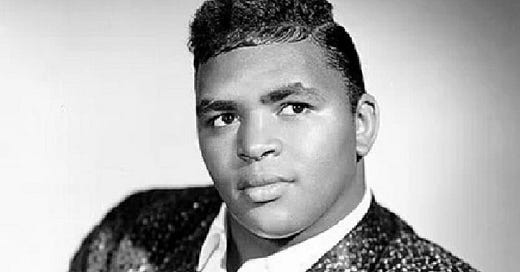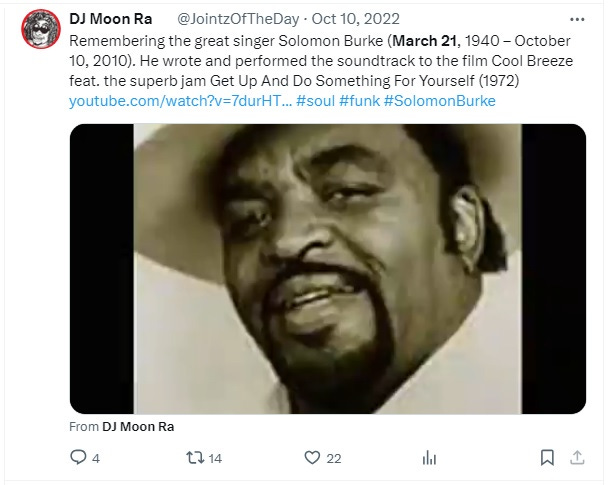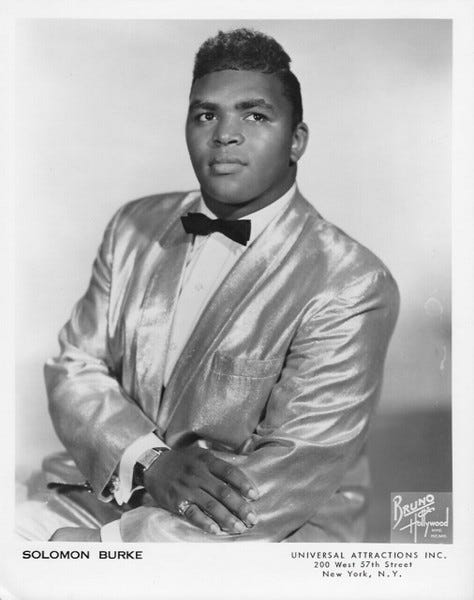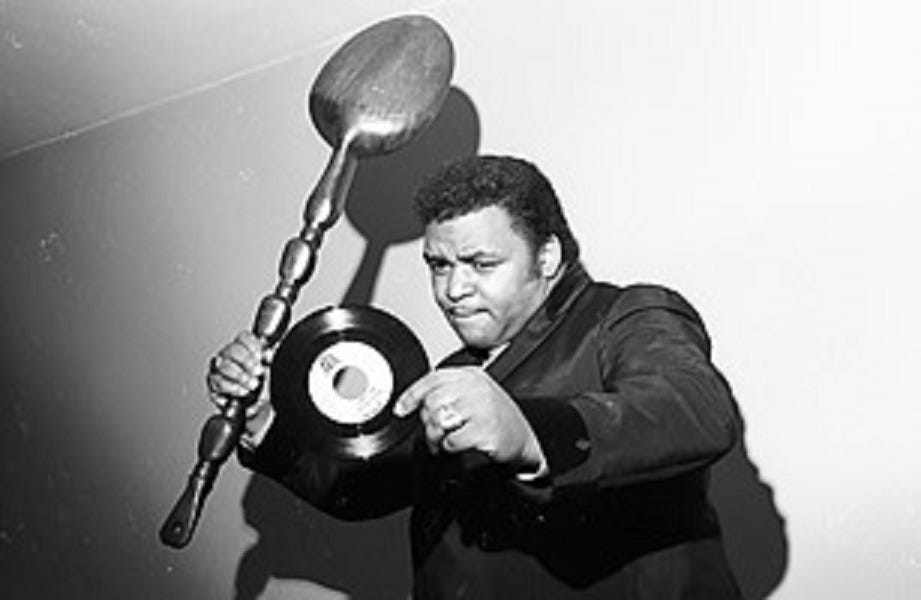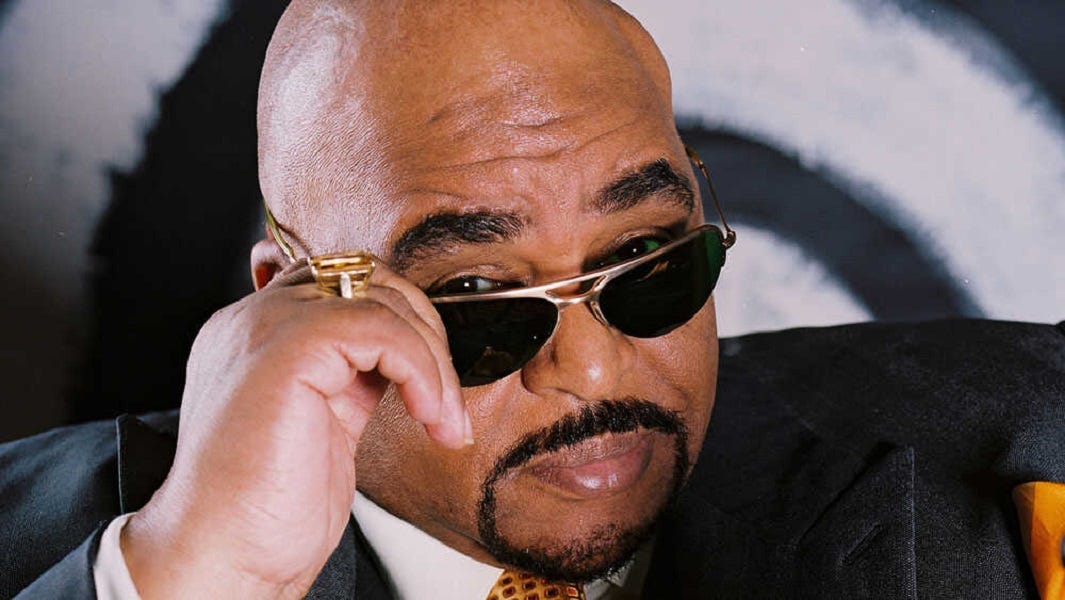Solomon Burke (March 21, 1940 – October 10, 2010) – Now Is The Time (1974)
This powerful, socially conscious anthem was featured on the soul legend's I Have A Dream concept LP featuring songs inspired by Martin Luther King, Jr.
View most updated version of this post on Substack
Search our full archives
The legendary singer Solomon Burke was one of the pioneering voices who combined gospel with R&B in the early 1960s and named an entire genre when he coined the term “soul music.”
James Solomon McDonald was born in the poverty-stricken neighborhood known as Black Bottom in West Philadelphia, on the second floor of his grandmother Eleanor Moore's row house. He was given the middle name Solomon after the congregation of the United House of Prayer for All People she hosted at her house, called Solomon’s Temple. His godfather was church founder “Daddy” Grace.
As a child, his grandmother encouraged him to listen to music on the radio and he soon learned to sing. He also started preaching, and was nicknamed the “Boy Wonder Preacher.” In an interview with NPR’s Fresh Air in 1986, Burke recalled:
"(I) started from wanting to preach at the age of two, which was very difficult for people to understand me at two, and at five they kept sitting me down. And at seven, they thought I was making too much noise. 'Round about eight years old they really took me serious."
His mother married Vincent Burke when Solomon was nine years old, and his name was changed to Solomon Vincent McDonald Burke. He began appearing on WDAS and WHAT-AM, hosting a gospel show on the latter station. In his early teens, he traveled with tent revivals throughout Maryland and the Carolinas.
While still in high school, Burke formed and sang lead with a vocal group, the Gospel Cavaliers. Shortly after the group split up, he entered a talent contest and won as a solo artist. First prize was a record contract. Soon three labels were clamoring to sign the 15-year-old, Apollo, Vee-Jay Records and Don Robey’s Peacock Records.
He went with Apollo, and released a string of records from 1955-58 that did not chart, including the superb gospel cut “No Man Walks Alone” (1956).
Following an argument with his manager, he left the label, and signed for a year with Philadelphia-based Singular Records. The second single he released for them was “This Little Ring” (1960) b/w the heartfelt sermon “I’m Not Afraid.”
In November, 1960, he finally found a long-term home at Atlantic Records, signing with them in a handshake deal with label heads Ahmet Ertegun and Jerry Wexler.
Burke’s arrival at Atlantic led to him coining the term “soul music,” after he clashed with Wexler over what type of material he would be recording. As Burke explained in a 2005 interview:
“I told them about my spiritual background, and what I felt was necessary, and that I was concerned about being labeled rhythm & blues. What kind of songs would they be giving me to sing? Because of my age, and my position in the church, I was concerned about saying things that were not proper, or that sent the wrong message. That angered Jerry Wexler a little bit. He said, 'We're the greatest blues label in the world! You should be honored to be on this label, and we'll do everything we can – but you have to work with us.'”
Then, during a radio interview, a Philadelphia DJ asked Burke, “You're singing from your soul and you don't want to be an R&B singer, so what kind of singer are you going to be?” To which Burke replied, “I want to be a soul singer.” And a whole new genre was born.
It was an ironic development, since it was Wexler who had originally come up with the phrase “rhythm and blues” in the late forties to replace “Race Records,” as Billboard’s chart for records by Black artists had formerly been known.
Burke’s second Atlantic single, the country song “Just Out of Reach (Of My Two Open Arms)” went to #7 R&B, crossed over to #24 on the Billboard Hot 100, and went gold. He followed it up with what became one of his signature songs, the #5 R&B hit “Cry to Me” (1962). Over the next few years, he reportedly kept Atlantic in business with his steady stream of hit records, landing 15 more singles on the charts between 1962-65.
Burke left Atlantic for Bell Records in 1969, and a year later signed with MGM Records. His first album for the label was released in 1971. Electronic Magnetism featured the uplifting anthem “All For The Love Of Sunshine.” It was co-written and produced by Mike Curb, and arranged and conducted by Gene Page.
He paid tribute to the emerging British blue-eyed soul talent Elton John (who was famously encouraged by Patti LaBelle to pursue his dreams of being a singer despite his self-doubts over whether he had enough stage presence) in the medley “Three Psalms for Elton.” It combined his early hits “Your Song,” “Take Me To The Pilot,” and “Border Song,” which was one of, if not the most socially conscious songs John ever recorded, with a powerful closing verse that was one of the few lyrics he solely wrote during his songwriting partnership with lyricist Bernie Taupin.
“Holy Moses / let us live in peace / Let us strive to find a way to make all hatred cease / There's a man over there / What's his color I don't care / He's my brother / let us live in peace”
Around this time, Burke performed the LP’s stellar title track “The Electronic Magnetism (That's Heavy, Baby)” live on an unknown TV show.
In 1972, MGM’s film division released Cool Breeze, one of the studio’s first follow ups to Shaft, its massive hit from the previous year. Burke composed the soundtrack, which was superb from start to finish. It was mostly co-written by himself and his son, Solomon Burke, Jr., including its slamming title track.
There were several stellar instrumentals like the hard-hitting “Fight Back” and the epic jam “The Bus.” The message song “PSR 1983” about the future consequences of poisoning our planet had also been included on Electronic Magnetism, and was co-written by Burke and his daughters Eleanor and Melanie.
Arguably the album’s masterpiece was the self-empowerment anthem “Get Up And Do Something For Yourself,” co-written by Burke and his son Solomon Jr.
After one more album on MGM, We're Almost Home (1972), Burke switched labels again to ABC/Dunhill. His only album release for that label was the socially conscious 1974 concept LP I Have A Dream. As its back cover noted, “This album contains many original samples from various speeches by Dr. Martin Luther King, Jr.,” such as on the gospel-flavored title track. Gene Page co-produced two of the LP’s best cuts, the message songs “Social Change” and “I Ain't Gonna Give Up (Till I Find A Way).”
Solomon Burke Jr. wrote or co-wrote most of the album’s songs, with his two-year old brother King Solomon Haile Selassie Burke credited as co-writer as a number of tracks, like the powerful anthem “Now Is The Time.”
For his late career comeback album Don't Give Up on Me (2002), Burke covered Ray Charles’ 1993 liberation song “None of Us Are Free” with the Blind Boys of Alabama as backing vocalists. It was co-written by Cynthia Weil, Barry Mann, and Brenda Russell. Many thanks to longtime Jointz Of The Day friend and supporter Elisabeth Tuma of Vienna, Austria for first turning us on to this track.
Happy Heavenly Birthday to the great Solomon Burke.
Further info:
“A Black Cowboy Finds His Soul,” interview by Terry Gross, Fresh Air / NPR, July 3, 1986.
“Songs of Solomon: Solomon Burke Interview,” by James Porter, Roctober, Issue 33, 2002.
“Solomon Burke: The Return of the King: Solomon Burke's Grand Comeback Becomes a Whole New Beginning,” by Kurt B. Reighley, No Depression, Issue #57, May–June 2005.
“Solomon Burke Full Interview,” NAMM (National Association of Music Merchants) Oral History Program, March 10, 2006.
“The Subject Was Soul: Solomon Burke,” interview by Denise Sullivan, June 8, 2012.
#soul #funk #gospel #SolomonBurke


